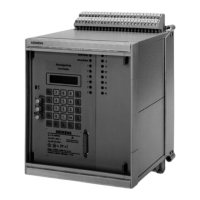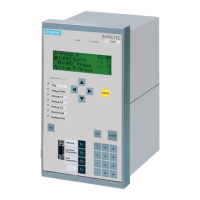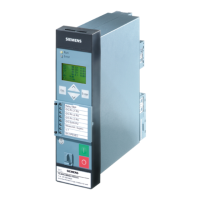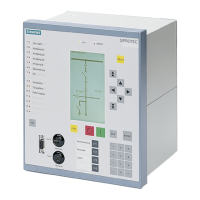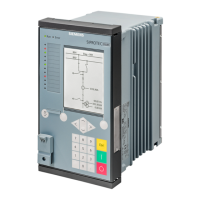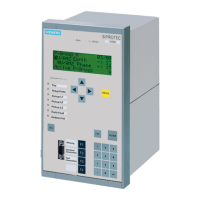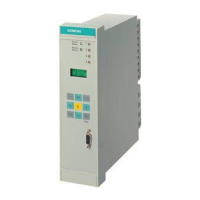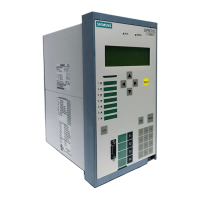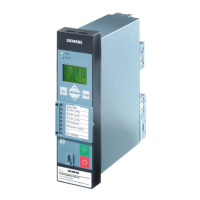Functions
6-164 7SA6 Manual
C53000-G1176-C133-1
Cable 1 3 km 7.5 A
Cable 2 5 km 12.5 A
Cable 3 2.6 km 6.5 A
Cable 4 5 km 12.5 A
Cable 5 3.4 km 8.5 A
Cable 6 3.4 km 8.5 A
Cable 7 2.6 km 6.5 A
Total 25.0 km 62.5 A
With an earth fault in cable 2, 62.5 A – 12.5 A = 50 A earth fault current will flow
through the measuring point, since 12.5 A flows directly from cable 2 into the fault.
Since that cable is amongst the longest, this is the most unfavourable case (smallest
earth fault current flows through the measuring point). On the secondary side, flows:
50 A/300 = 0.167 A.
The relay should be set at approximately half this value, ,! = A.
In resonant-earthed networks directional determination is made more difficult since
a much larger reactive current (capacitive or inductive) is superimposed on the critical
wattmetric (active) current. The total earth current available to the relay can therefore,
dependent upon the network configuration and location of the compensation coil,
assume very different values in magnitude and phase angle. The relay, however, must
evaluate only the active component of the earth fault current, that is, I
E
· cos ϕ. This
demands extremely high accuracy, particularly with regard to phase angle
measurement of all the instrument transformers. Also, the relay should not be set
unnecessarily sensitive. When used in compensated networks therefore, reliable
directional determination is only expected when core balance or window-type
transformers are used. Here also, use the rule of thumb: setting at half the expected
measured current, whereby only the residual wattmetric current is applicable. This
residual wattmetric current is provided principally by the losses in the Petersen coil.
Example:
The same network, as in the previous example, is considered to be
compensated by a Petersen coil. The coil is matched to the total network. The
compensation current is thus 62.5 A. The losses should be 4 %. For earth fault
directional determination, core balance current transformers 60 A/1 A are fitted.
Since the residual wattmetric current is derived principally from the coil losses, it is,
independent of earth fault location, approximately the same:
4 % of 62.5 A = 2.5 A.
This active current is superimposed by a reactive current which can amount to up to
62.5 A for earth faults near the Petersen coil! On the secondary side we have
2.5 A/60 = 0.041 A.
As setting value ,! = A is selected.
If the earth fault protection is also to trip (Address 6HQV(DUWK)OW = 2Q),
set in address 75,3'LUHFWLRQ, if for earth faults the signal is tripped
IRUZDUG(normally in line direction), UHYHUVH (normally in direction of busbar) or
QRQGLUHFWLRQDOThis setting can only be changed with DIGSI
®
4 under
“Additional Settings”.
Phase Angle
Compensation
The high reactive current component in resonant-earthed networks and the
unavoidable air gap of the core balance type current transformers require a phase
angle compensation of the current transformer. This is possible with addresses
to . For the actual connected burden the maximum angle phase displacement &7
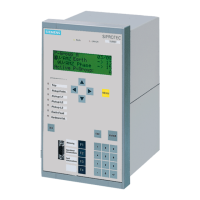
